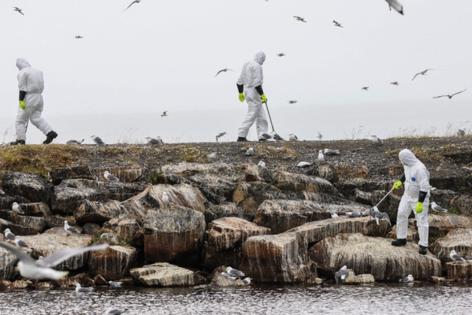Editorial: More aggressive response needed to protect food supply from bird flu
Published in Op Eds
Four years after the COVID-19 virus swept across the nation, another pathogen is gaining traction. And while a highly contagious and stubborn avian influenza (designated H5N1) isn’t an immediate risk to people, it’s time to step up defenses to guard against an outbreak that could threaten our food supply.
Thankfully, some of those measures are in place, and state officials are monitoring the situation both in the commonwealth and in other states as a precaution. But the spread of this disease and a failure, so far, to contain it is alarming and bears close attention in the coming months.
The H5N1 virus was identified among migratory waterfowl in China in 1996 and infections have waxed and waned since. The latest surge began in 2020, when it was detected in Europe and Asia, and has subsequently spread to four other continents, including Antarctica.
Primarily affecting birds (which is why it’s commonly called “bird flu”), it has spread to other animals, putting animals raised for human consumption, including chickens and cows, at risk. The U.S. Department of Agriculture has confirmed infections in 121 herds of cattle in 12 states, including 58 herds in eight states in the last 30 days.
The disease has been detected since March in wild waterfowl in the Northern Neck, Middle Peninsula and Hampton Roads regions, according to the Virginia Department of Agriculture and Consumer Services. But Virginia has so far been spared from livestock infections, which is good news for the commonwealth’s poultry and beef farmers, though North Carolina reported one infected herd in April.
Many Americans may not know about this avian flu outbreak, but they are feeling its effects. Infected poultry must be destroyed and that’s taken a toll on chicken and egg supplies, driving up prices for both. Further spread among domestic cattle would do the same to beef, though it has not yet been the case.
Despite the rampant spread and the potential threat to food supplies, federal officials have been slow to respond. In echoes of the COVID pandemic, there hasn’t been sufficient testing of livestock, so data is slow in coming and provides an inaccurate snapshot of the situation. Outreach to farm workers has also been sluggish for several reasons, language barriers among them, even though researchers believe they could be instrumental in slowing the spread of infection. NPR reported last week that only 45 people have been tested for H5N1 nationwide.
Again, the risk to humans from this virus isn’t great — so far. Only four people are known to have contracted the virus since 2020, but the fact that it can sicken people is cause for some alarm.
Those who work with livestock are at the greatest risk, though the USDA recommends not consuming raw milk (the purchase and selling of which is illegal in Virginia) and fully cooking ground beef and eggs. The pasteurization process kills the virus, but the USDA found non-harmful traces of H5N1 in an estimated 20% of the nation’s dairy products in May.
Federal and state officials are acting cautiously, urging health professionals to order H5N1 tests when warranted and urging farmers to enact stricter biosecurity measures, such as quarantining new livestock for at least 21 days. They don’t want to spark a panic or undermine billion-dollar industries the nation depends on for food.
But the fear is these strategies lack the urgency needed to keep the outbreak from spiraling. Federal agencies should be ramping up testing and partnering with private labs to process those tests with all deliberate speed. And both Washington and Richmond should be doing more to raise public awareness about H5N1, doing so thoughtfully and without alarmism.
By taking a stronger hand in responding to H5N1, these efforts can stave off a full-blown crisis in American agriculture. Protecting the nation’s food supply should be the priority, and the country will be better served by more aggressive action rather than the wait-and-see approach that has so far done little to slow this outbreak.
_____
©2024 The Virginian-Pilot. Visit at pilotonline.com. Distributed by Tribune Content Agency, LLC.







Comments